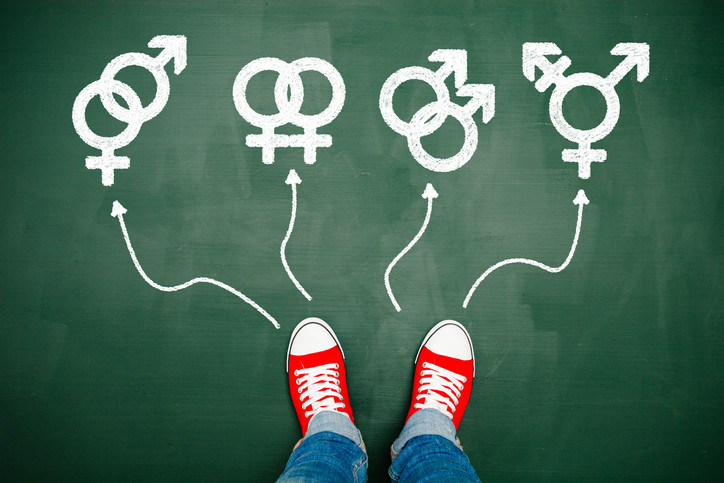Bisexuality and health: The cost of invisibility

On September 23, 2019, the 20th anniversary of , the National Institutes of Health (NIH) held its first-ever bisexual health research workshop. As an invited panelist at this event, sponsored by the NIH’s , I joined 19 other researchers to discuss key findings, gaps in knowledge, and future directions.
You may be asking yourself: Is there really a need for this workshop? How is bisexual health different from the health of other groups? How many people even identify as bisexual?
What is bisexuality?
, a prominent bisexual activist and writer, defines bisexuality as “the potential to be attracted �� romantically and/or sexually �� to people of more than one gender, not necessarily at the same time, not necessarily in the same way, and not necessarily to the same degree.�� People don’t have to identify with the label “bisexual�� to have a bisexual orientation.
Bisexuality can mean having attractions to or sexual behavior with people of more than one sex or gender �� for example, feeling attracted to both women and men. Some people have a range of “nonmonosexual�� identities �� that is, identities that go beyond heterosexual or lesbian/gay �� including . Some people have more than one identity (I identify as both queer and bisexual). The preferred umbrella term for anyone with a nonmonosexual orientation is “bi+.��
Who is bi+?
People identify as bi+ across genders, races/ethnicities, socioeconomic groups, and ages, but some groups (people of color, adolescents, and ) are more likely to identify as bi+. It may come as a surprise to learn that bi+ people are the largest sexual minority group. Among , more people identify as bisexual than identify as either lesbian or gay. Among adults, bi+ people represent a substantial part of the population. But despite these numbers, there is less research on bi+ health and less available funding for research, compared with research on lesbian and gay people.
How might being bi+ affect health?
If you’re bi+, a of people of different sexual orientations and racial/ethnic backgrounds found that you may be more likely than people with other sexual orientations to experience certain health problems. For example, gastrointestinal problems, arthritis, and obesity occur more often among bi+ women and men. Additionally, women who are bi+ may have a poor health-related quality of life, while bi+ men may have high cholesterol, high blood pressure, and cardiovascular disease.
If you’re bi+ and you’re also a woman or a transgender person, your risk for poor health �� including substance use, depression, and suicide �� climbs even higher compared with other bi+ people (see and ).
Why are bi+ people more likely to experience poor health?
Experts in the field of bisexual health research believe negatively affects health outcomes. Minority stress refers to experiences of prejudice or discrimination based on stigma that lead to poor health. Bi+ people experience , such as negative stereotypes about what it means to be bisexual (bisexuality is a phase, bisexual women are promiscuous, bisexual men are vectors of HIV). Feeling invisible may also create problems. These unique forms of minority stress can be harmful for bi+ people’s health.
- Bisexual invisibility can affect the quality of medical care. A bisexual woman who is in a relationship with a woman, but also has sex with men, may not be offered birth control or counseling about sexually transmitted infections (STIs) at a doctor’s appointment, because she is (incorrectly) assumed to be a lesbian and not at risk for pregnancy or STIs.
- Double discrimination can harm mental health. Bi+ people experience discrimination from both heterosexual and sexual minority communities, related to repeatedly needing to “come out�� as bi+. This double discrimination can lead to isolation and loneliness, which can be harmful for mental health.
What steps can you take to counter these issues?
If you are bi+, you can improve your health by
- with others who are supportive of your bisexuality, including people who are also bi+ and can understand the unique stresses that bi+ people sometimes face
- being honest with your doctor or mental health provider about your bisexuality, so that you can get the care you need.
Even if you are not bi+ yourself, you can support bi+ people by
- examining your biases and assumptions (for example, not everyone with a different-gender partner identifies as heterosexual) and educating yourself about bi+ people
- educating others about bi+ people to challenge stereotypes and reduce stigma, to increase acceptance of the bi+ community.
About the Author

Sabra L. Katz-Wise, PhD, Contributor
Disclaimer:
As a service to our readers, �첩���� Publishing provides access to our library of archived content. Please note the date of last review or update on all articles.
No content on this site, regardless of date, should ever be used as a substitute for direct medical advice from your doctor or other qualified clinician.
















